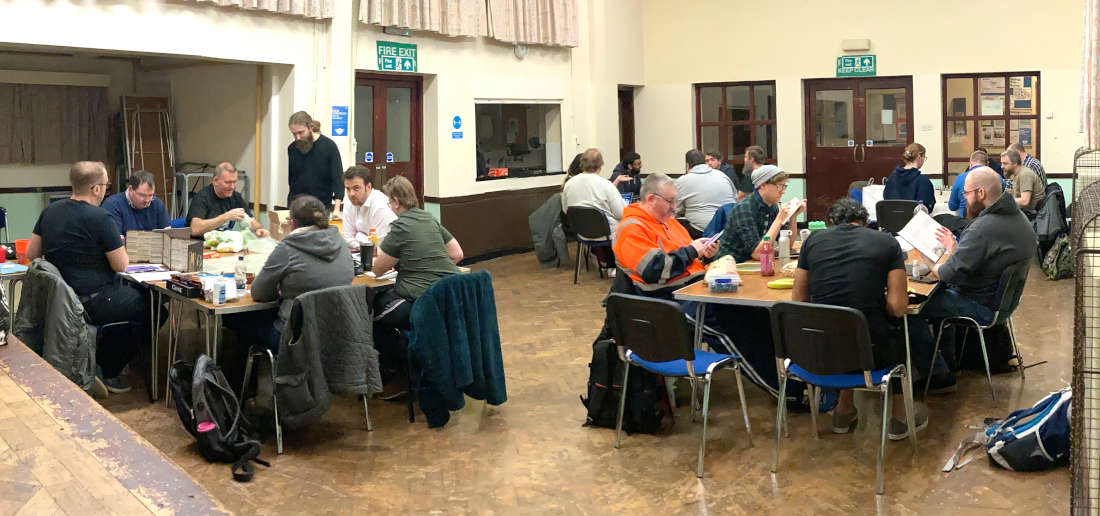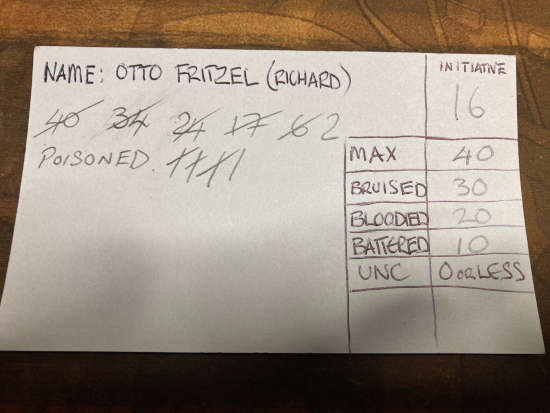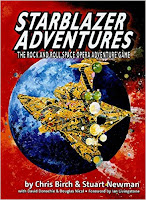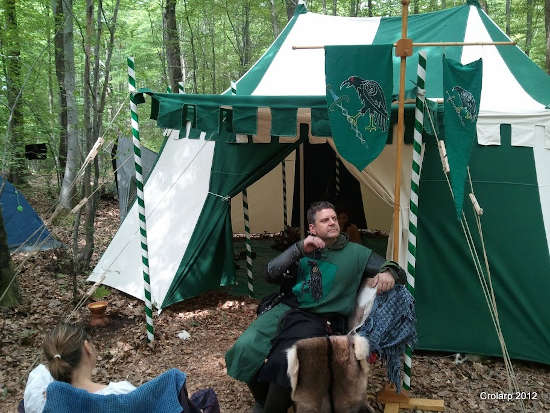I have been loosely following the exploits of Runehammer for a couple of years on YouTube and I had been intrigued by the concept of the Index Card RPG (ICRPG) but was always too scared to dip my toes in the water until now First Impressions of ICRPG
As a no-prep DM, I am always looking for something that I can get to the table in as little time as possible. Character gen needs to be trivial and the system should be easy to pick up with a few basic concepts and a comfortable familiarity for those players of other systems. In addition the system needs to lean towards narrative play whilst having enough mechanical aspects that hte inevitable combat and magic flow smoothly and consistently.
ICRPG seems to have all of this but we will need to see how it plays and how easy it is for me to DM.
Do It Yourself RPG
At the core of the game (it's in the title) and one of the biggest attractions is the index card concept. Brandon Gillam, the man behind Runehammer is of course a consumate artist and has drawn many of these flash card images which are used in play and you are encouraged to draw your own to fit your own game concept or storyline.
I'm no artist so the first order of the day is to assemble a stack of index cards with images from ICRPG Volumes 1 & 2 pasted onto them. This took a few hours which I am sure to get back when actually playing the game.
I'm going to sort these into 3 specific decks; Props, Places & Monsters ahead of my first game.
(DM From the Future: Keeping these decks secret from the players is quite the challenge when all the cardbacks are white. Watch this space for an ICRPG Card Stamp set.
First Play
I played this for the first time at our recent Dragons Keep Games Day to a small bunch of players of varying skill levels. The objective wass to run through a few scenarios and see how the players took to the system and how much time I spent looking through the rulebook.
I thought about pre-genning some characters to get us off to a flying start, but time was not on my side. I underestimated how long it would take to glue 100 pictures to index cards in the few evenings I had before Game Day. I must find a way of printing directly onto the card or perhaps use stickers.
However, on the day character gen took about 15 minutes. I need to create a quick flowchart for those not familiar with the standard fantasy or sci-fi RPG character tropes and having multiple copies of the starter character loot table and weapons is also a must.
The players chose their minis and, after a brief explanation of how the target numbers for encounters worked, we were off to the races.
Generating The Plot
As I mentioned, I want this game to run for no-prep pickup, so I used the cards to generate the plot. Ths is where ICRPG really shines as a picture says a thousand words and sparks the players imagination far more than any long description can. For those playing along at home, everything in BOLD is an index card.
It wouldn't have been a fantasy RPG if it didn't start in a tavern so I layed out one of the village building cards that looked tavern like and then surrounded these with four other cards North, South, East and West. This represented the rumours of adventure that they learned from the locals whilst they were enjoying their drinks. They didn't fancy the desert of desolation, the barrier keep or the necromancers tower so headed off East to the mountains to kill a dragon. "Now that's what I call worldbuilding!!"
Encounter 1
Heading out along the windy road through the low hills they encountered an abandoned cart with a broken wheel. As they pondered where the owner and horse were I slapped down a Target 10 card and asked them all to roll their WIS for a passive perception check to detect the two animated plants that were about to ambush them.
They quickly got into the action and I explained how the range system worked.
DM mistake number one was not reading up on the very limited magic system in ICRPG. Mages start with a magic missile but the mage in the party decided he wanted to dehydrate the first plant. As he had a spell book from his starting equipment, I said role a D8 and you can have that many spells written in your book. Even if I had read the spell list I would probably have opted for something similar in any case.
Meanwhile another club member walked in so I threw him the rule book and a blank character sheet and explained the basics of character gen. Combat was swift and decisive and it was not long before our new member of the party was discovered entangled behind a nearby bush. He went off in search of his horse dobby accompanied by the elf ranger whilst the others set about mending his wagon.
Following a trail of foot prints I slapped down the cave mouth with teeth. They approached cautiously as I really played up the jagged teeth vibe and they found dobby the horse inside. At the back of the cave they found a rusty portcullis and a lever on the otherside. The ranger ran back to the others to get help.
The mage decided that casting a shrink/grow spell on one of the characters was the way to go and so a tiny halfling walked easily through to the other side. This was another spell for the mage's book and we determined on the roll of a D8 how many minutes the spell would last for. He rolled a 6, but I made a DM Decision that one of his other spells was a dispell. The rogue was instantled restored back to his original size and with a critical hit pull of the lever the ancient mechanism shuddered to life and the portcullis rose.
Beyond the portcullis they discovered some Corridors and Stairs and I made the elf wizard roll a DEX check as he triggered a trap. Looking above he saw a Dangling Stone Weight about to crush him. He used up one of his spells, to stone shape the weight and the pressure plate thereby disabling the trap. At the next corridor I told them that the corridor was bathed in a greasy red light. I thought that they would pick up on the fact that they had essentially triggered the dungeons alarm system but sadly no.
Encounter 2
In the next encounter they walked into a huge circular room with a golden skull on a pedastal at its center. Down went the 16 Target Card and a WIS check revealed the sleeping floating high in the ceiling.
A haste spell was cast and most of the party ran towards the pedastal but they were not stealthy and the beholder awoke firing off a couple of blasts. DM mistake number two was not having read the monster description for the beholder which would have made it slightly less taxing to dream up some eye beam effects, "but this is not my first rodeo..."
There was some really inventive spell play from Jason the mage and a lot of channeling of Indiana Jones. The final encounter was quite cool as several players got blasted by various eyebeams and the players experienced the death mechanic, which was useful to know.
Eventually they discovered that the gold skull was actually The Skull of Calderon and they used its power to dispatch the beholder and grabbed some well earned loot.
All in all a very fun experience for all and a very cheap and easy way to get into RPGs or as a primer to running your very first game as a DM.
What ICRPG isn't
If you are looking for a system which has layers of complexity where you can build your character from a low level up to some mythical epic hero then ICRPG is not for you. Character progression is in there but it will be fairly short due to the condensed nature of the game and it's simplicity.
What I Bought
- Index Card RPG Core (2nd Edn) rules - a soft back copy (surprisingly expensive in the UK) from eBay for £23.69 delivered
- Index Card RPG Vol 1 - 100 Cards depicting Props, Places and Monsters for fantasy games such as the Runehammer Alfheim setting. Many of the cards in the first two sets are found as illustrations in the core rulebook.
- Index Card RPG Vol 2 - 100 Cards depicting Props, Places and Monsters for dungeon games.
- Index Card RPG Vol 3 - 100 Cards depicting Props, Places and Monsters for Sci-Fi games such as the Runehammer Warp Shell setting. Cool powerloader image!!
- Index Card RPG Vol 4 - 100 Cards depicting Props, Places and Monsters for the Wild West Horror inspired Weird West Setting.
- ICRPG Target Cards - a set of numbered Target cards showing the easy (-3) and difficult (+3) target numbers.
- ICRPG Character Sheet - a basic character sheet which I printed at half size to create a booklet format with plenty of space for players to scribble their notes.
- 1000 Blank Record Card Cards (6"x4") - I needed to restock in any case as I use record cards a lot in my games.
Other Useful Resources
ICRPG Character Generator - like DnD Beyond for your ICRPG character and it spits out a nice PDF.


























